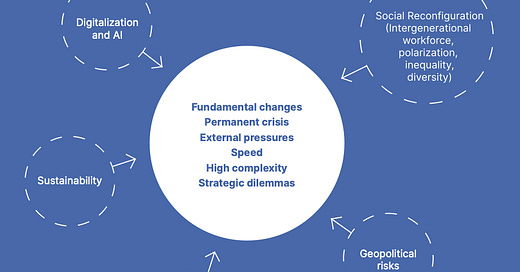In summary: The Copenhagen Business School Leadership Think Tank has released their ongoing insights on what it takes for organization leaders to manage a changing and uncertain external environment. The report proposes a four-part framework for the leadership skills needed: orchestrating speed and rhythm, bridging diversities, enabling the organization, and sustaining moral compass. It builds on the center’s academic work in leadership and societal challenges going on under the hood, for example, a Wiersema & Mors 2024 Journal of Management paper on Women Directors and Board Dynamics.
Source: https://www.cbs.dk/files/cbs.dk/cbs_leadership_think_tank_report_2024_1.pdf
You don’t need Donald Trump to be elected to know we are in a chaotic and changing world defined by perma-crisis perhaps more than ever. As a recent Copenhagen Business School Leadership for the Future report sums it up: no matter where you take on leadership responsibility, you are experiencing significant shifts in the organisational context in the mid 2020s.
But there is a huge gap between realization of context pressures and dilemmas, and what concretely to do to mitigate or navigate them. It’s all very well to look out the window at 40,000ft and exclaim, “high winds and stormy weather ahead!”
So, tell me actually now. How does the pilot land the plane?
In their report The CBS Leadership Think tank report sees four angles to this, as follows:
Source: https://www.cbs.dk/files/cbs.dk/cbs_leadership_think_tank_report_2024_1.pdf
In the report, these four categories: enabling speed and rhythm; bridging diversities; enabling the organization; and sustaining moral compass, are themselves just a skeleton in which the hard “how-to” question remains so far only answered at the level of direction and principle. Nevertheless, it is a framework for understanding the various interlocking and complementary activities of strategic leadership, and a template for ongoing study.
In pursuit of applicable answers and leadership guidance, the strength of the CBS Leadership Think Tank is how it bridges between management academics and leadership practitioners, and this was powerfully on display at the report launch in mid-September, where Academic Co-Directors Louise Mors and Silviya Svejenova, and Centre Director Eva Fog Bruun were featured, along with about 15 industry leaders.
Among these, Brian Grevy CEO of Hunkemöller and past Pitzner board chair said, the fundamentals in leadership don't change, but what has change is the extent of transformational social and geopolitical events on the outside “The old way of doing things from the boardroom-out are gone.”
Nima Sophia Tisdall, CEO of Nordic Makers, said of leaders: “we need a North Star,” a better point of view on the future, to be able to act coherently in times of uncertainty. "Long term planning is out, long-term thinking very much in."
Marcus Schindler EVP, Chief Scientific Officer, Novo Nordisk, commented that, despite turbulent times and an ongoing normalized crisis, Novo Nordisk does in fact make old-school 10 -year forecasts and plans. But “we are constantly looking at what can derail it!”
Marie Munk CFO, Det Kongelige Teater was perhaps the most direct of the lot, saying with reference to leadership in times of future uncertainty: “We don't have the skills.”
If ever there was a cry for the CBS Leadership Think Tank and the strategic futures methods community more generally to fulfil, this is it. And academically, at least, some of this is in train, for example, a recent Journal of Management paper by center director Louise Mors, Women Directors and Board Dynamics: Qualitative Insights from the Boardroom.
In it, Mors and co-author Wiersma evaluate the effect women are having on company board culture and practice. They summarize their findings as follows:
“Specifically, our interview data suggest that women directors play a significant role in changing board dynamics due to several behavioral factors…Contrary to existing board norms, which have been described as ‘not rocking the boat’ and ‘not being the skunk at the picnic’ by asking too many questions (Lorsch & MacIver, 1989), women directors ask in-depth questions and are willing to speak up about issues confronting the board.
“Furthermore, our study provides evidence that women’s behavior has both a direct effect on board dialogue and an indirect effect by influencing how men directors interact in the boardroom. As a result, discussions become more open, less formal, and are more transparent and conducive to the sharing of different viewpoints. Thus, while boards have been characterized as lacking ‘controversial or candid discussion’ (Hambrick, Werder, & Zajac, 2008: 383), our findings suggest that the presence of women directors is likely to mitigate this behavior.”





